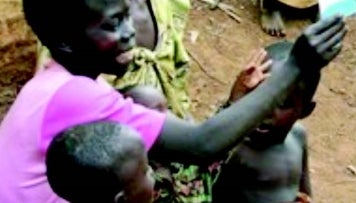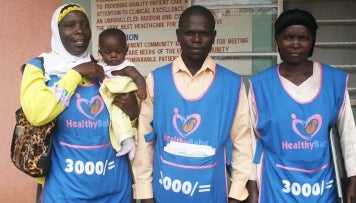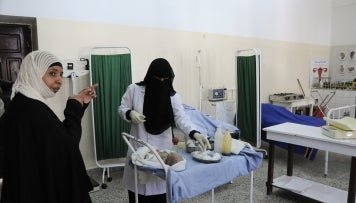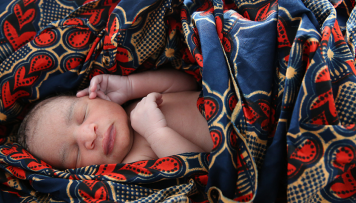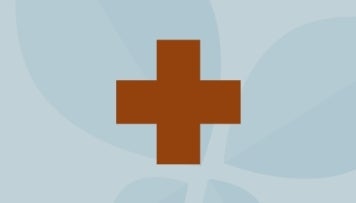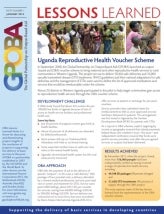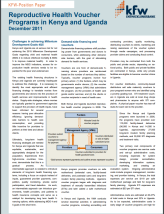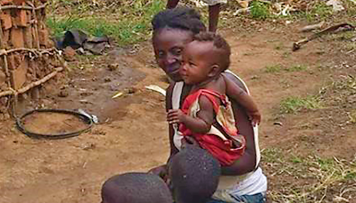
Photo: Jessica Lopez / World Bank
The first time I traveled to Uganda, in October 2016, I met a young mother whose strength and resilience I still think about today; an important reminder of why and for whom I work as an international development professional. My colleagues and I met this woman at her home in a rural village in southwestern Uganda, a simple mud hut with a thatched roof, surrounded by four small children and a smiling baby in her lap. In her local dialect, she told us how she manages a small plot of corn to feed her family, though oftentimes it is not enough, and she worries about her ability to provide for her growing family. Her husband, she said, was at the local pub.
She went on to politely thank the group—which consisted of colleagues from Uganda’s Ministry of Health, Marie Stopes Uganda non-governmental organization, the World Bank, and local community leaders—for helping her to deliver a healthy three-month old baby girl, and for giving her the choice (through family planning) to decide if and when she and her husband would have additional children. For now, she said, she needed to focus on her family of seven.
At 3%, Uganda’s annual population growth rate is among the highest in the world. In 2015 alone, when the project began implementation, approximately 1.7 million babies were born in Uganda, or around 4,600 every day. Further, the maternal mortality ratio stands at 375 per 100,000 live births—for reference, this is 436% higher than the 2030 target of less than 70 maternal deaths per 100,000 live births set by the United Nations Sustainable Development Goals.
Most maternal deaths are preventable by accessing quality prenatal care, skilled assistance during delivery, and post-natal care services; however, these services often remain underutilized, not only to access barriers such as high service fees, low coverage of health care facilities, or insufficient supplies of drugs and equipment, but also due to cultural norms and longstanding practices of home deliveries. Also, transportation is an issue for many women who live too far from the nearest health facility to walk.
The good news, however, is that trends are improving, and there are solutions available to help address these challenges. I was in Uganda as part of a support mission for the Uganda Reproductive Health Voucher Program, a result-based financing (RBF) project, which aimed to increase access to family planning services and skilled and safe maternal health care during pregnancy, delivery, and postnatal stages among poor women living in rural and disadvantaged areas.
The project incentivized pregnant women to utilize these services at accredited health facilities by offering them a low-cost voucher, around the equivalent of $1, to cover the cost of care. In addition, transportation was provided for women who required it for purposes of referral. By purchasing the voucher, the women were given the ability to identify a public or private facility of their choosing where they received quality guaranteed services with no extra fees at point of care. Health providers were then reimbursed by a grant from the Global Partnership for Results-Based Approaches (GPRBA) through the World Bank to cover the full cost of service (only after service claims had been verified, to prevent fraud). More than 175,000 women in rural areas benefited from the program, and the increase in revenue helped many providers to obtain much needed equipment, hire staff, and improve service overall.
The project team was creative and ambitious with its marketing activities, knowing that changing entrenched behaviors is more complex than a simple financial incentive. The marketing strategy leveraged relationships with existing community groups and local leaders, and carried out mass media campaigns, including through popular radio talk shows. The media campaign, called “ndi HERO,” (“I am a hero”) was designed to motivate pregnant women and persuade family and community members to support pregnant women to access services from a health facility, using the slogan: “every pregnant mother’s dream is a healthy baby.”
The woman we met with had heard about the program from her neighbor, who was happy with the services. She dreams of a healthy family, and the voucher program is playing a small, but important role to make that a reality. In addition to this program, additional support of $165 million has been mobilized by the World Bank, the Global Financing Facility, and the Swedish Government to ensure maternal and child health continues to be prioritized.
--Jessica Lopez
[1] Marie Stopes Uganda is a non-governmental organization which provides reproductive health and family planning services across Uganda.
[2] United Nations, Department of Economic and Social Affairs, Population Division (2015). World Population
Prospects: The 2015 Revision.
[3] World Bank, 2017
[4] UNICEF, 2008
